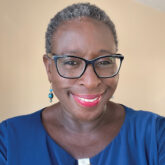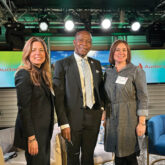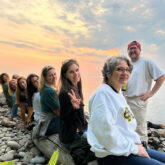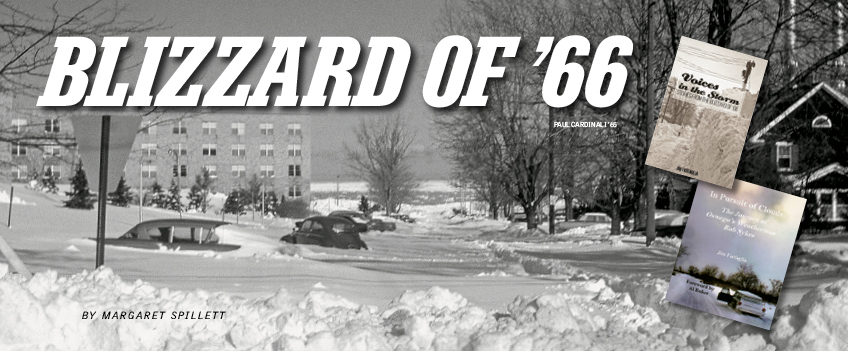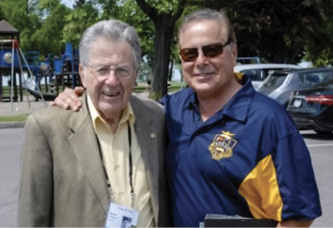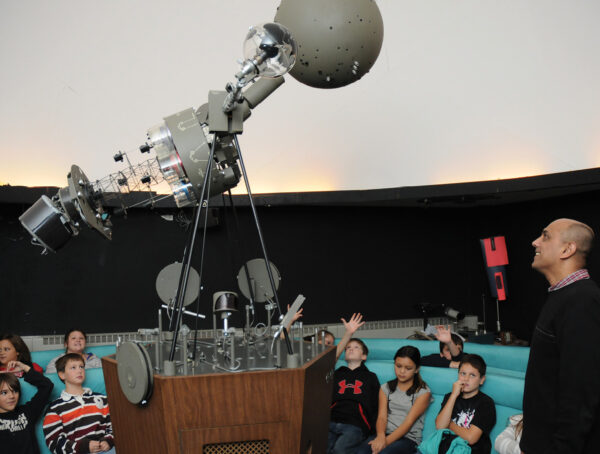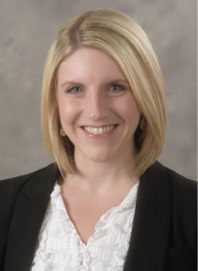Diana Abu-Jaber ’80 shares an excerpt she adapted from her new memoir, Grace at the Table, slated to be published in spring 2016 by W.W. Norton. Her novel, Birds Of Paradise was awarded the Arab-American National Book Award. Her novels, Origin, Crescent and Arabian Jazz, and her memoir The Language of Baklava, also won several awards, including the PEN Center Award, the American Book Award and the Oregon Book Award. She teaches at Portland State University, but resides much of the year in South Florida, where she lives with her husband and her young daughter, Gracie.
Grace at the Table
 It’s been my experience that the more someone warns you not to do something, the more you want to do it. You might become afraid or dismissive, but it’s still luscious as a dare.
It’s been my experience that the more someone warns you not to do something, the more you want to do it. You might become afraid or dismissive, but it’s still luscious as a dare.
My father, also known as Bud, forbids outright all dalliance with men. Any invitation to a party, dance, sleepover is waved in the air: warning, warning!
“You don’t know what they’re capable of.” Bud, foreboding.
“Who?” I can’t help asking, though I know the answer very well.
“Men!”
“But you’re a man, Dad.”
“That’s how I know!”
He’s vigilant. A guardian, protector. Perhaps it’s because he was one of the youngest among a rowdy gang of brothers. He tells me, “My mother brought a pot of chicken to the front of the table and all those boys went crazy. They used to say, watch your fingers!” When it got down to the littlest boys the pot would be reduced to a few measly scraps. They fought over the fatty tail, they cracked open the fine bones and sucked the marrow from them like straws. He shows us these hiding places, the last succulent bites— “oysters” of meat secreted in the back. Over the dinner table he murmurs, a secretive smile, “Those are the best parts.”
I sit beside him as he combs the bulgur wheat. You have to search the bulgur so carefully, he instructs, pointing. The tiniest stones hide inside the grains. Bits of sand that look like bulgur. “That’s how life is!” he says with a swoop of his hand, mysterious. Always answering some other thing that no one asked.
When you cover the grains with water a starchy mist swirls up around your fingers: I see goats with fishtails, creatures from my relatives’ stories. Oryx, unicorn, fairies. The metamorphosis of cooking mirrors that of story-imagining. Learn to observe and the stories rise and explain things.
*
Instead of going to dances and parties, I stay home and write. By the time I’m in high school, I’ve written four novels. In my junior year, I discover that somehow I have enough credits to escape.
Sixteen years old, enrolled at SUNY Oswego up the road, and immigrant cousins are everywhere, big Magnum P.I. mustaches, eyes lively, black, and narrow as whips. Boys bring me plastic cups foaming with beer. The smell of old, sour beer is all over the place. The first time a boy tries to kiss me with an open mouth I jerk back, guffawing like he’d hit me with a joy buzzer. When I see the look on his face, I take a breath, steady myself, and say, “Okay. Do over.”
In my sophomore year, the writer John Gardner comes to speak at my college. I ambush him at a faculty home reception with a stack of typewritten pages. I ask, voice wobbling, amazed at my own nerve, if he’d maybe, someday, glance at my story. To my astonishment, he groans and patiently lowers himself into a chair at the kitchen table. For long minutes he sits there, hunched in a leather jacket, his shoulder-length white hair falling forward, his soft, thought-creased face tipped over the pages. He stops me later, story in hand. “I wrote down a few things for you here.” A page of handwritten notes. Eventually the notes go astray, but his advice remains: Graduate studies. Daily writing. Hone the craft.
Also, at the end of the comments, written in soft pencil: You better choose—because you’re a woman—between writing and having a family.
I hope you’ll choose writing.
Gardener’s injunctions play over and over in my head. I accept his directives without question, not overly concerned; I believe the choice is already made. Writing is essential as a nutrient. And at 19, the idea of children is a distant planet.
You might also like
More from Class Notes
Class Notes – Winter 2024
Class Notes - Winter 2024 Editor’s Note: Due to changes to our typical production schedule, this Class Notes reflects submissions from July …
From the Archives – Winter 2024
From the Archives - Winter 2024 SAVE THE DATE: April 8, 2024 Oswego will experience a very rare total eclipse of the …
Oswego Matters – Winter 2024
Oswego Matters - Winter 2024 As a mother of two young children, I’ve grown accustomed to frequent transitions; to new beginnings; …

